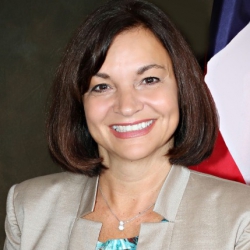
Debbie Alford, Head of the Georgia Lottery, Sent a Letter of Concern to the U.S. House Attorney in April
The State of Georgia is emerging as an unlikely proponent of regulated online gambling. Over the past few days, the lottery providers of Georgia have signalled their intention to oppose South Carolina Senator Lindsey Graham’s anti-online gaming bill, the Restoration of the Wire Act, which would ban all online gambling in the United States. The lottery interest see a danger to their own business model.
Most southern states tend to have conservative views when it comes to moral issues. To many, gambling is seen as a moral issue. That’s why so many states in the American south ban land-based casino gambling. Georgia itself does not allow land casinos, though casino cruises launch from August Brunswick and Savannah. These ships take players on the Atlantic Ocean, beyond the 3-mile international waters line, where Georgia laws do not apply.
George Lottery Betting
Georgia has a native lottery gambling industry. In fact, that lottery industry was one of the first in the United States, and Georgia’s lottery interests were a key contributor to the expansion of the multi-state lottery associations, Mega Millions and Powerball.
Two years ago, the Georgia Lottery began online ticket sales. Those sales have accounted for $6 million in revenues, which is used to fund the Georgia school system. As people become more familiar with the technology, online lottery sales are on an upward tick. Online lotto revenue numbers should only increase, especially when the full effects of the mobile gaming revolution are felt.
Restoration of Wire Act Seen As a Threat
The Restoration of the Wire Act could put those plans in jeopardy, though. The Restoration of the Wire Act, being championed by Senator Graham in the US Senate and Utah’s Jason Chaffetz in the House of Representatives, hopes to ban most online gambling in the USA. The exemptions it would allow are for horse betting, fantasy sports, and lottery gambling.
The problem is with the precedent such an act would set. For most of U.S. history, individual states have been allowed to determine whether gambling should be allowed inside its borders. The people Nevada could build a Las Vegas without federal interference. New Jersey could build Atlantic City, and so on. If the precedent is set that the U.S. federal government gets to decide the laws involving online gambling, that puts Georgia’s online lottery sales under the whims of the U.S. Congress. Lawmakers outside the state could strike down a major source of revenue at any time.
Online Georgia Lotto Sales
Officials at the Georgia Lottery are concerned about more immediate effects, too. They believe any potential federal online gambling ban might affect their operations sooner, rather than later.
The lottery is concerned enough that Debbie Dlugolenski Alford, Head of the Georgia Lottery, sent a letter to the U.S. House Attorney back in April. According to the Atlanta Journal-Constitution Online, Dlugolenski Alford stated in the letter than the proposal would end Georgia’s online lottery distribution channel, which is critical to the success of the state lottery. Without the channel, the lotto would not have the ability to grow revenues to benefit the state’s education programs.
HOPE Scholarships
The lottery program provides thousands of HOPE scholarships each year. The program also funds tens of thousands in pre-K assistance. According to the lottery, the program might lose up to $39 million in funds, which would take money from the HOPE scholarship and pre-K assistance programs.
As the old saying goes, politics makes strange bedfellows. The online gambling industry might never have expected to have supporters from a state which bans almost all forms of gambling. With Sheldon Adelson will to spend anything needed to ban online gaming and the numbers from New Jersey’s online gambling industry disappointing, the legal Internet gambling industry in the U.S. will accept any help it gets .
